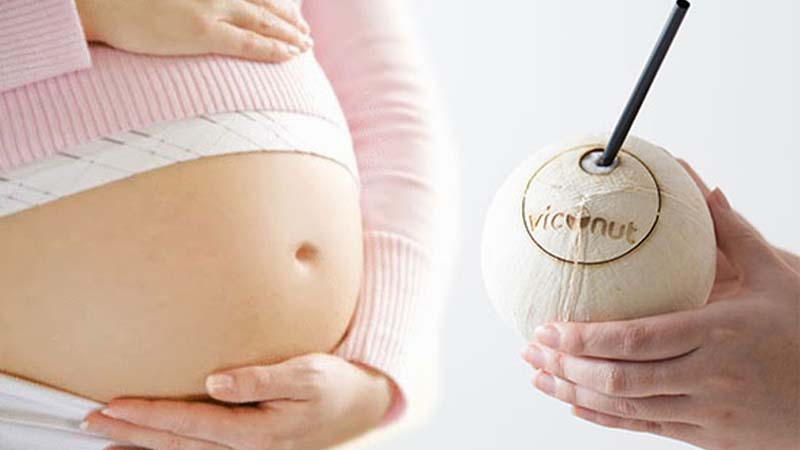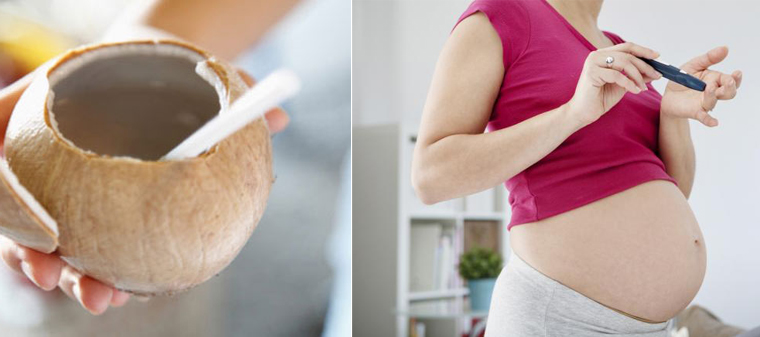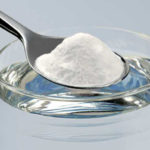1 Benefits of Coconut Water for Pregnant Women
Hydration and Amniotic Fluid
– Pregnant women are advised to drink 3 liters of water daily to stay hydrated during pregnancy. Dehydration can lead to fatigue, dizziness, nausea, and fainting.
– Coconut water is an excellent natural way to hydrate, without the addition of chemicals. It also helps increase amniotic fluid, which is beneficial for mothers experiencing oligohydramnios (low amniotic fluid levels).
 Coconut is an excellent source of hydration for pregnant women
Coconut is an excellent source of hydration for pregnant women
Electrolyte-Rich
– Coconut water is packed with electrolytes like calcium, potassium, sodium, and phosphorus, which help maintain blood pressure, fluid balance, pH levels, and muscle function.
– It’s also rich in vitamins A and B, as well as other vitamins, ensuring a healthy pregnancy and fetal development.
 Coconut water provides electrolytes and is rich in vitamins
Coconut water provides electrolytes and is rich in vitamins
Boosts Immunity
– Coconut water effectively prevents constipation, bloating, and frequent urination, which are common issues during pregnancy.
– It also enhances the immune system, thanks to its high content of beneficial lauric acid, which fights bacteria, viruses, and inflammatory conditions that may arise during pregnancy.
 Coconut water reduces bloating and constipation while boosting immunity
Coconut water reduces bloating and constipation while boosting immunity
Low Sugar Content
– This is crucial in preventing gestational diabetes.
– Compared to sugar cane juice or other bottled drinks, coconut water is natural and contains less sugar (approximately 6 grams per cup), making it a healthier option for expectant mothers.
2 Harmful Effects of Improper Consumption
While coconut water has many benefits, it should not be consumed indiscriminately during pregnancy:
– First Trimester: Coconut water has a cooling effect and can cause an upset stomach, affecting the body’s metabolism and having a negative impact on the pregnancy. It’s also high in fat and can worsen morning sickness.
 Coconut water is not recommended during the first trimester
Coconut water is not recommended during the first trimester
– Best During Second Trimester: Coconut water is ideal during the second trimester, but consumption should be reduced in the third trimester. While it’s beneficial, excessive intake can lead to uncontrollable weight gain, especially towards the end of the pregnancy.
– Caution for Diabetics: Despite its low sugar content, excessive consumption can still contribute to gestational diabetes.

[captionnews]Excessive coconut water consumption can lead to gestational diabetes[/captionnews]
– Skin Tone Myth: The belief that drinking coconut water will result in a fair-skinned baby is not scientifically proven. Skin tone is largely determined by genetics, so don’t fall for this myth and overconsume coconut water.
3 When and How Much to Drink
-
Pregnant women should wait until the second and third trimesters to drink coconut water. While small amounts in the first trimester are unlikely to cause harm, it’s still best to limit consumption during this period.
-
Avoid excessive intake; stick to a moderate amount, such as 1 cup (100-150 ml) per day.
-
Don’t drink coconut water if you’re feeling unwell or fatigued.
-
Refrain from drinking coconut water that has been left overnight, as its composition changes and may affect digestion.
-
Avoid drinking coconut water in the evening, as it may increase the frequency of nighttime bathroom visits.
-
If you have a history of weakness or low blood pressure and wish to drink more coconut water, consult your doctor.
-
For mothers with polyhydramnios (excess amniotic fluid), limit coconut water intake during the second and third trimesters, and avoid it completely in the third trimester.
 Pregnant women should consume coconut water in moderation and seek medical advice
Pregnant women should consume coconut water in moderation and seek medical advice
Reference:
Coconut water is indeed a great source of hydration and nutrition for pregnant women. However, it should be consumed in moderation and according to medical advice to ensure the best outcome for both mother and baby.





































